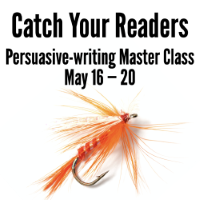Hint: Cutting copy is not the solution
What makes people share information?

With this much information every day, how do you cut through the clutter of competing messages?
Martin J. Eppler and Jeanne Mengis recommend these six “paradoxes” for presenting information that breaks through the clutter:
- Familiar surprise. Grab audience members’ attention in an intriguing, yet accessible, way. You might try an interesting subject line, a clever lead or an unusual graphic.
- Detailed overview. Before diving into the details, let your audience members know what they’ll learn from this piece. You might provide context and an overview in a summary after the headline.
- Flexible stability. Don’t make audience members learn new formats and structures to get your information. Standardized website and memo formats and information mapping help audience members find what they’re looking for faster.
- Simple complexity. Just shaving more words off your message doesn’t solve information overload. You also need to make the information more understandable. Visual and verbal metaphors clarify complex concepts; they help audience members understand new information by linking it to familiar ideas.
- Concise redundancy. Deliver information in multiple formats to reach different information consumers. You might present information through statistics, analogies and examples in an article, for instance, or visually and verbally in a meeting.
- Unfinished completeness. Get audience members involved in the message with comments, polls and questions at the ends of articles. When audience members participate in a message rather than just consuming it, they understand it better and remember it longer.
Find Eppler and Mengis’s work in “Preparing Messages for Information Overload Environments.” That’s a report of the International Association of Business Communicators’ Research Foundation.
Note: Cutting word count does not make this list.
How do you write messages that readers want to read?
If you want to Catch Your Readers, you need to think like a reader. Then you need to use the bait your reader likes, not the bait you like.
 So what’s the bait the reader likes?
So what’s the bait the reader likes?
Learn a four-step process for making your message more relevant, valuable and rewarding to your audience at Catch Your Readers, our persuasive-writing workshop starting May 16.
There, you’ll learn the formula readers use to determine which messages to read. Discover two rewards you can use to boost audience interest in your message. And learn a magic word that focuses reader attention on your message.
Save up to $100 with our group discounts.
